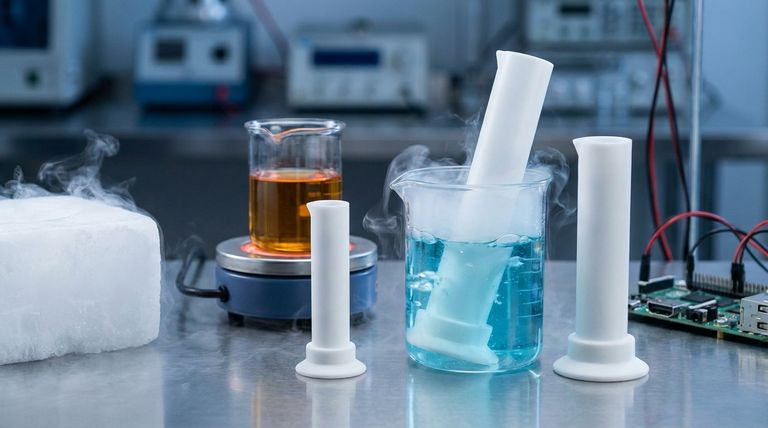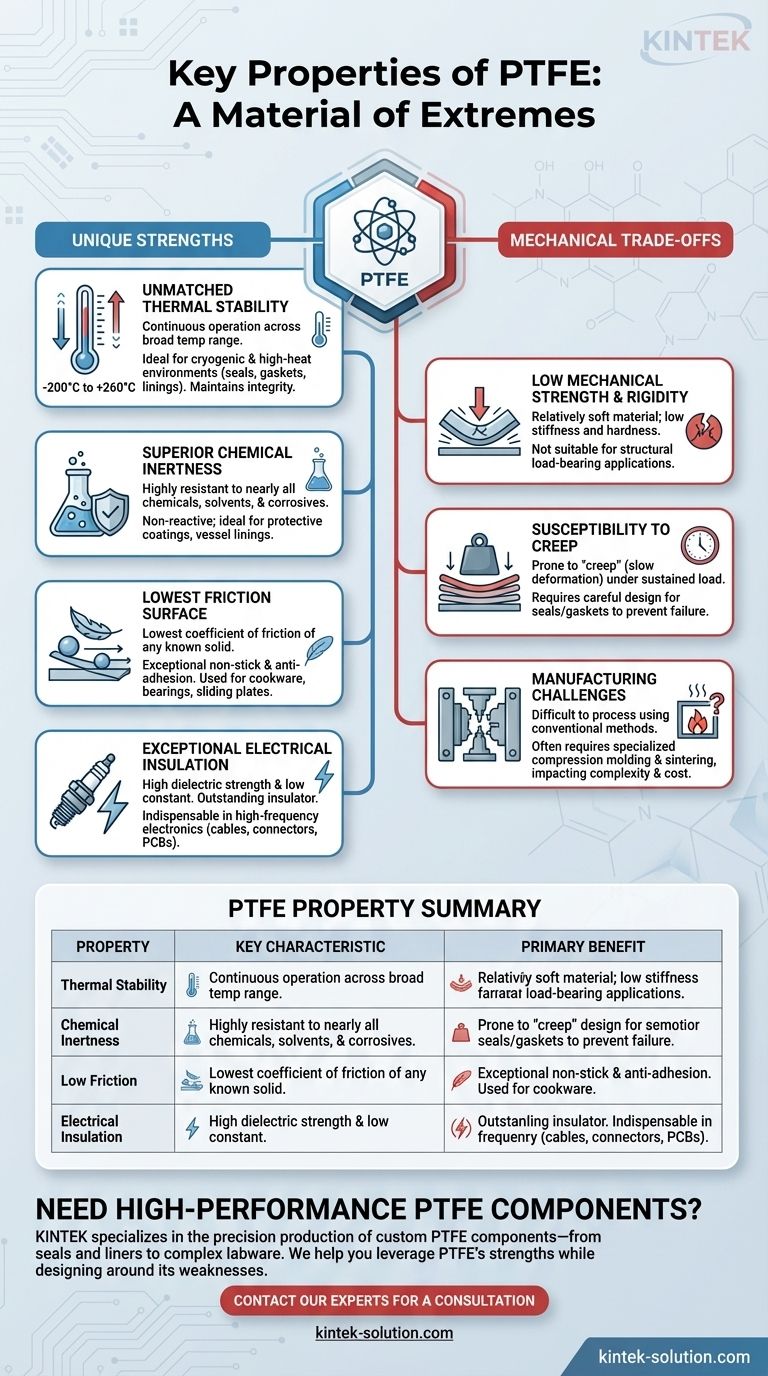At its core, Polytetrafluoroethylene (PTFE) is a material of extremes. It is valued for a unique combination of properties that allow it to perform in environments where most other materials would fail. Its primary attributes include exceptional chemical inertness, an incredibly wide operating temperature range, one of the lowest coefficients of friction of any solid, and excellent electrical insulation.
While often recognized by its brand name, Teflon, the true value of PTFE lies in its ability to provide unmatched performance in harsh chemical, thermal, and electrical conditions. However, this specialization comes with a critical trade-off: it has very low mechanical strength.

Unpacking the Core Properties of PTFE
To understand if PTFE is the right choice for an application, you must look at its specific performance characteristics. These properties are not just a list of features; they are the reasons it is selected for demanding industrial, electronic, and chemical tasks.
Unmatched Thermal Stability
PTFE can operate continuously across an exceptionally broad temperature range, typically from -200°C to +260°C (-328°F to +500°F).
This stability allows it to maintain its integrity and performance in both cryogenic applications and high-heat environments without degrading, making it highly versatile for seals, gaskets, and linings.
Superior Chemical Inertness
PTFE exhibits extremely high resistance to nearly all chemicals, solvents, and corrosive agents.
Because it is so non-reactive, it is an ideal material for protective coatings, vessel linings, and components used in aggressive chemical processing industries where material degradation is a primary concern.
The Lowest Friction Surface
PTFE has the lowest coefficient of friction of any known solid material. This gives it exceptional non-stick and anti-adhesion characteristics.
This property is the reason it is used for everything from non-stick cookware to self-lubricating bearings and sliding plates, where minimizing resistance and preventing material buildup is essential.
Exceptional Electrical Insulation
This material possesses a very high dielectric strength and a low dielectric constant, making it an outstanding electrical insulator.
These electrical properties make it indispensable in high-frequency electronics, such as insulation for high-performance cables, connectors, and substrates for printed circuit boards.
Environmental Resilience
PTFE is highly resistant to degradation from weathering, UV light, and moisture, with very low water absorption.
This ensures long-term stability and reliability for components used in outdoor or other exposed applications where environmental factors would compromise lesser materials.
Understanding the Trade-offs: The Mechanical Limitations
No material is perfect, and a trusted advisor must highlight the limitations. PTFE's unique strengths are balanced by significant mechanical weaknesses that are critical to understand.
Low Mechanical Strength and Rigidity
The most significant drawback of PTFE is its low mechanical strength, stiffness, and hardness. It is a relatively soft material.
This means it is not suitable for structural applications that require load-bearing capabilities. It will deform easily under pressure.
Susceptibility to Creep
Under sustained compressive load, PTFE is prone to "creep," or slow, continuous deformation over time.
This must be factored into the design of seals and gaskets, as over-tightening or constant high pressure can lead to failure. While its low compression modulus helps it seal well at low pressures, its tendency to creep can be a liability.
Manufacturing Challenges
The same properties that make PTFE so useful, like its chemical inertness and high melting point, also make it difficult to process using conventional methods like injection molding.
It typically requires specialized techniques such as compression molding and sintering, which can impact design complexity and cost.
Making the Right Choice for Your Application
Selecting PTFE should be a deliberate decision based on its unique strengths, not a default choice. Match its properties to the primary demand of your project.
- If your primary focus is extreme chemical or thermal resistance: PTFE is an ideal choice for linings, seals, and components that must survive harsh process environments.
- If your primary focus is a low-friction or non-stick surface: It is unparalleled for coatings, bearings, and sliding components where lubrication is difficult or impossible.
- If your primary focus is high-frequency electrical insulation: Its excellent dielectric properties make it a top-tier material for specialized cables, connectors, and circuit boards.
- If your primary focus is structural strength or rigidity: You must choose another material or consider a "filled" grade of PTFE, which adds other materials to improve its mechanical properties.
Understanding PTFE's profile of exceptional specialized performance alongside its mechanical softness is the key to leveraging it effectively.
Summary Table:
| Property | Key Characteristic | Primary Benefit |
|---|---|---|
| Thermal Stability | Operates from -200°C to +260°C | Reliable performance in cryogenic and high-heat environments |
| Chemical Inertness | Resistant to nearly all chemicals | Ideal for aggressive chemical processing and coatings |
| Low Friction | Lowest coefficient of friction of any solid | Excellent for non-stick surfaces and self-lubricating parts |
| Electrical Insulation | High dielectric strength and low constant | Critical for high-frequency electronics and cabling |
Need High-Performance PTFE Components?
PTFE's unique properties make it ideal for demanding applications in the semiconductor, medical, laboratory, and industrial sectors. However, its mechanical limitations require expert design and manufacturing to ensure success.
KINTEK specializes in the precision production of custom PTFE components—from seals and liners to complex labware. We help you leverage PTFE's strengths while designing around its weaknesses, offering everything from prototypes to high-volume production.
Let's discuss your project requirements and engineer a solution that delivers unmatched reliability.
Contact our experts today for a consultation
Visual Guide

Related Products
- Custom PTFE Measuring Cylinders for Advanced Scientific and Industrial Applications
- Custom PTFE Parts Manufacturer for Teflon Containers and Components
- Custom PTFE Parts Manufacturer for Teflon Parts and PTFE Tweezers
- Custom PTFE Square Trays for Industrial and Laboratory Use
- Custom PTFE Volumetric Flasks for Advanced Scientific and Industrial Use
People Also Ask
- Why are PTFE vials considered environmentally friendly? Reduce Lab Waste with Durable Reusables
- What are some exceptional properties of PTFE? Unlock Unmatched Performance in Extreme Environments
- What material is the PTFE bottle made from? Discover the Benefits of 100% Virgin PTFE
- What makes the PTFE bottle durable? Unmatched Chemical & Thermal Stability for Demanding Applications
- What are the unique properties of PTFE that make it commercially valuable? Unlock Unmatched Performance



















